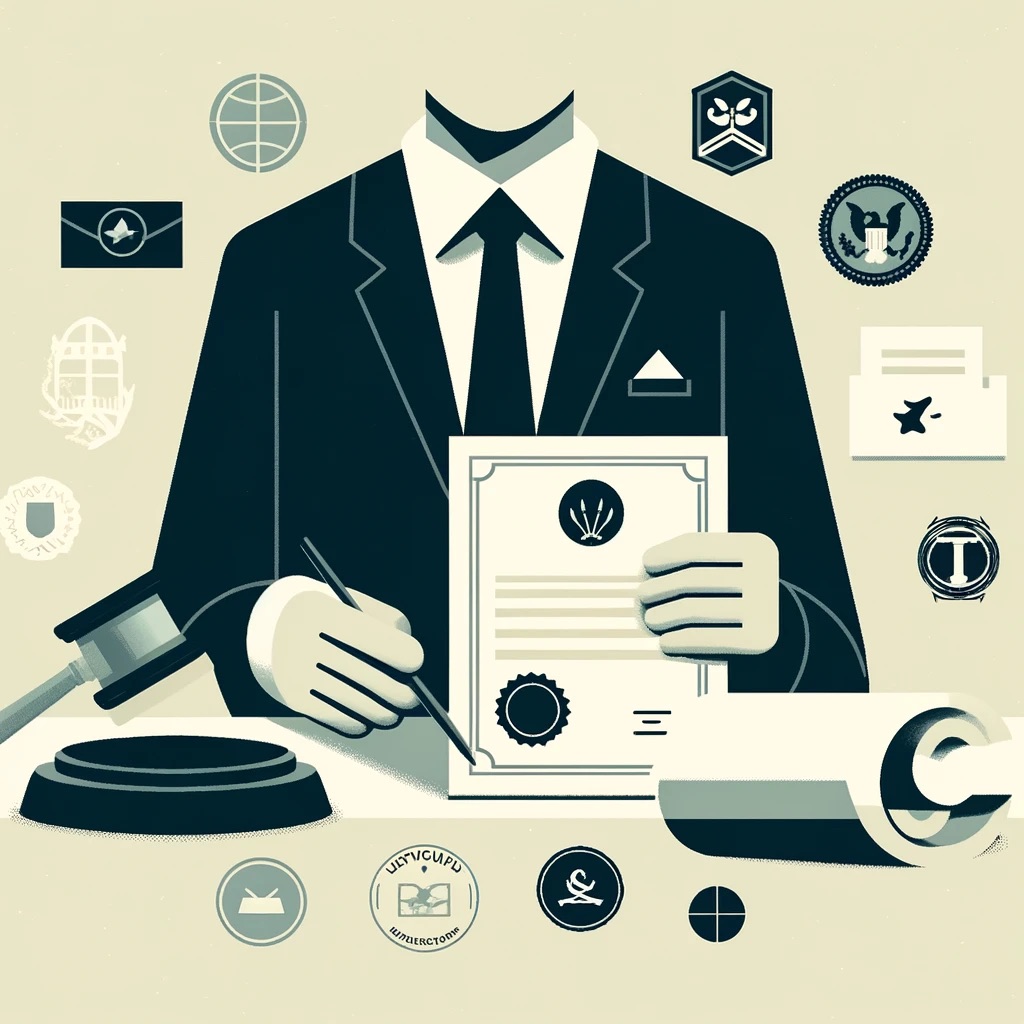In Kuwait, individuals and businesses often require official documents for various purposes such as legal transactions, residency matters, educational applications, or business dealings. When the individual is not in Kuwait or is unable to handle the process in person, they may need to appoint a lawyer to act on their behalf. The lawyer can obtain the required documents, authenticate them, and send them outside the country. This process is legally permissible under Kuwaiti law, but it must follow specific guidelines to ensure legality and accuracy.
This article provides a detailed overview of the legal framework and procedures involved in appointing a lawyer in Kuwait to handle official document retrieval, authentication, and dispatch abroad.
1. Legal Framework for Appointing a Lawyer in Kuwait
Under Kuwaiti Civil Law and Law No. 42 of 1964 regarding the regulation of the legal profession, individuals are allowed to appoint lawyers or legal representatives to act on their behalf in legal and administrative matters. This includes tasks such as obtaining, certifying, and delivering official documents. The legal process for appointing a lawyer is governed by Kuwait’s Civil Code and various laws related to legal procedures, notarization, and international document dispatch.
Key Aspects of Appointing a Lawyer:
- The client (principal) grants the lawyer (agent) power of attorney through a legally valid power of attorney (PoA) document.
- The scope of the lawyer’s authority must be clearly defined within the PoA, specifying the lawyer’s ability to obtain, authenticate, and send documents.
- The lawyer must act within the bounds of the power granted to them and comply with relevant Kuwaiti laws.
2. Power of Attorney (PoA) in Kuwait
To authorize a lawyer to obtain and send official documents outside Kuwait, the individual must issue a power of attorney that outlines the lawyer’s specific responsibilities. The PoA can be general or specific, depending on the needs of the client.
Types of Power of Attorney:
- General PoA: This type of PoA grants the lawyer broad authority to act on the principal’s behalf in multiple legal and administrative matters, including document retrieval.
- Special PoA: This PoA is limited to specific tasks such as obtaining a particular document, certifying it, and sending it outside Kuwait.
The PoA must be:
- Notarized: The PoA must be officially notarized to be legally valid. In Kuwait, this is typically done through the Ministry of Justice at the Notary Public offices.
- Authenticated: If the PoA needs to be used internationally, it must be authenticated by the Ministry of Foreign Affairs and the embassy of the country where the document will be used.
3. Obtaining Official Documents
Once the lawyer is appointed via the PoA, they can proceed with obtaining the required official documents. These may include:
- Civil documents such as birth certificates, marriage certificates, or death certificates.
- Commercial documents such as business licenses, tax certificates, or company registration documents.
- Educational certificates issued by Kuwaiti educational institutions.
- Legal documents such as court judgments, police clearance certificates, or contracts.
The lawyer must visit the relevant Kuwaiti governmental authorities to request these documents on behalf of the client. Key institutions include:
- Public Authority for Civil Information (PACI): For civil records.
- Ministry of Justice: For legal documents and judgments.
- Ministry of Commerce and Industry: For business-related documents.
- Educational institutions: For academic certificates and transcripts.
4. Authentication of Official Documents
Authentication is a critical step, especially if the documents are intended for use outside Kuwait. Kuwaiti law allows for the authentication of official documents to ensure their legality and validity in foreign jurisdictions.
Steps for Document Authentication:
- Initial Certification: The lawyer first ensures the document is officially certified by the issuing authority in Kuwait. For example, civil documents must be certified by PACI or the relevant ministry.
- Notarization: The lawyer may then need to have the document notarized by a Kuwaiti Notary Public.
- Ministry of Foreign Affairs (MOFA) Certification: The lawyer must have the document certified by the Kuwaiti Ministry of Foreign Affairs. This ensures the document is recognized as a valid Kuwaiti document internationally.
- Embassy Authentication: If the document is being sent to a foreign country, the embassy of that country in Kuwait may also need to authenticate the document to confirm its legality.
5. Sending Documents Outside Kuwait
Once the documents have been obtained and authenticated, the lawyer can proceed with sending them to the designated foreign country. Kuwaiti law permits lawyers to act on behalf of their clients in sending important documents abroad, provided the PoA grants them the necessary authority.
Methods of Sending Documents:
- Courier Services: Lawyers can use reliable international courier services such as DHL, FedEx, or Aramex to send documents securely and track their delivery.
- Embassy or Consular Services: In some cases, the documents may be sent through the diplomatic or consular services of the receiving country’s embassy in Kuwait.
The lawyer must ensure the documents are sent through secure and traceable methods to guarantee their safe delivery to the recipient.
6. Compliance with International Law
When sending official documents abroad, the lawyer must ensure compliance with international conventions and laws. Kuwait is a member of the Hague Apostille Convention. Therefore, if the receiving country is also a member, the lawyer can obtain an Apostille from the Ministry of Foreign Affairs, simplifying the legalization process. For countries not part of the Hague Convention, the documents must be authenticated by the foreign embassy in Kuwait.
7. Responsibilities and Legal Obligations of the Lawyer
Lawyers in Kuwait are bound by strict ethical standards and legal obligations under Law No. 42 of 1964 regulating the legal profession. When handling official documents for clients, lawyers must:
- Act in the best interest of the client.
- Ensure the accuracy and authenticity of all documents.
- Follow the exact scope of authority granted in the PoA.
- Maintain confidentiality and protect the client’s personal information.
- Avoid any fraudulent or illegal practices.
8. Potential Legal Issues
While appointing a lawyer to handle official documents is generally straightforward, certain legal issues may arise, such as:
- Disputes over the scope of the PoA: If the PoA is unclear or ambiguous, disputes may arise about the lawyer’s authority.
- Forgery or fraudulent documents: If a lawyer knowingly submits fraudulent or altered documents, both the lawyer and the client may face legal consequences.
- Cross-border legal complexities: Depending on the country where the documents are being sent, additional legal procedures may be required to ensure the documents’ validity.
Conclusion
Under Kuwaiti law, it is legally permissible to appoint a lawyer to obtain, authenticate, and send official documents abroad. This process requires a well-drafted power of attorney and adherence to the legal procedures for notarization and authentication. Appointing a competent and trustworthy lawyer is essential to ensure that the process is conducted smoothly and in compliance with both Kuwaiti and international laws.
By following the correct legal procedures, individuals and businesses can handle their document-related needs efficiently, even when they are located outside Kuwait.

